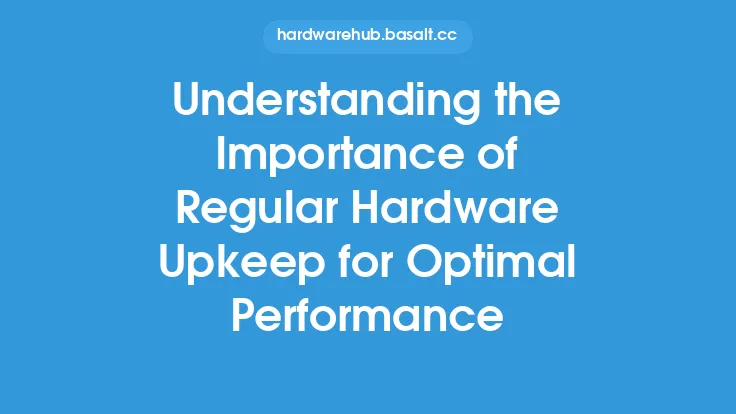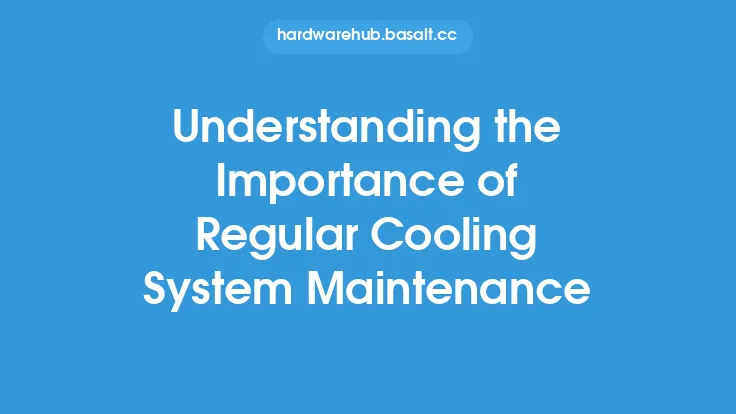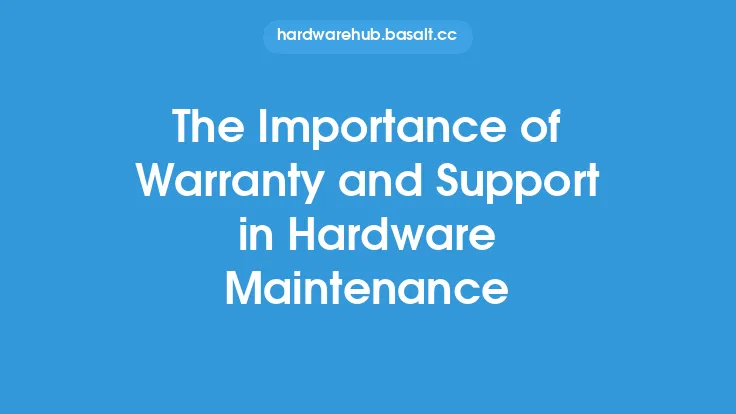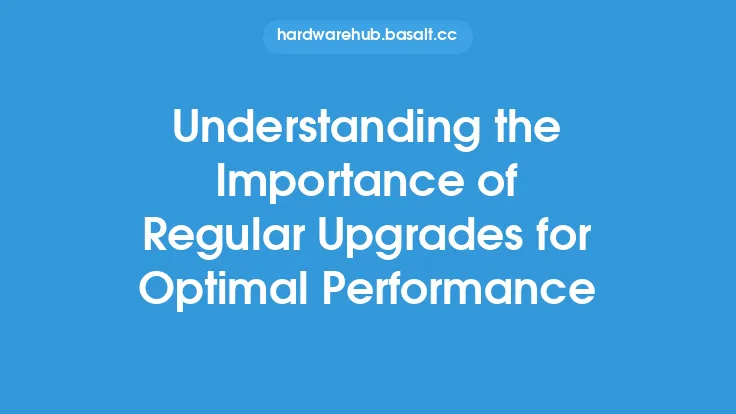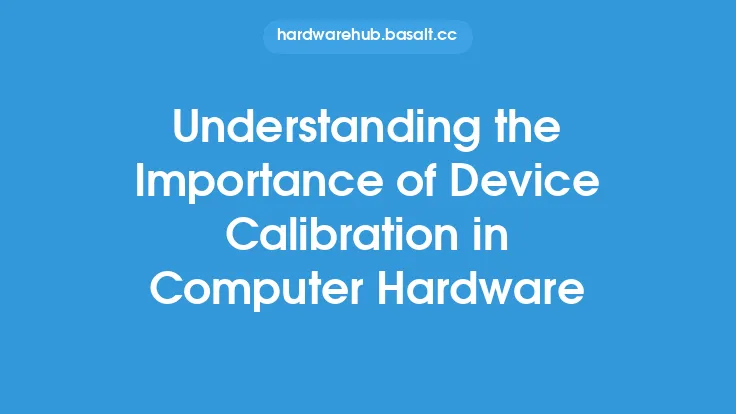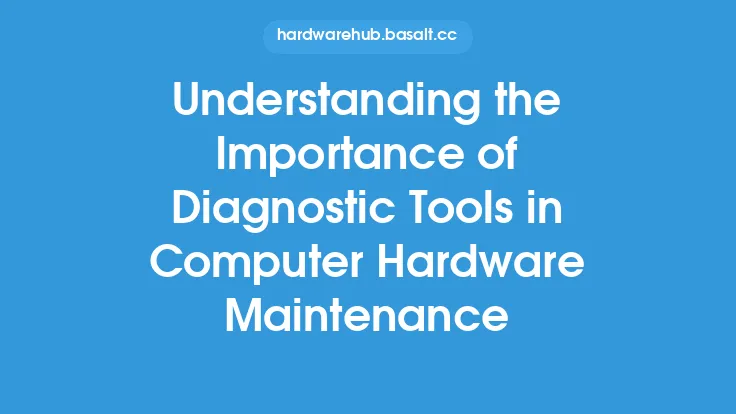Regular hardware maintenance is a crucial aspect of ensuring the optimal performance, reliability, and longevity of computer systems. It involves a series of tasks and procedures designed to prevent hardware failures, reduce downtime, and maintain the overall health of the system. In this article, we will delve into the importance of regular hardware maintenance, its benefits, and the various techniques and strategies involved in maintaining computer hardware.
Introduction to Hardware Maintenance
Hardware maintenance is an essential part of computer system administration. It encompasses a range of activities, including cleaning, inspecting, and testing hardware components, as well as performing repairs and replacements as needed. The primary goal of hardware maintenance is to prevent hardware failures, which can lead to system crashes, data loss, and decreased productivity. Regular maintenance helps to identify potential issues before they become major problems, allowing for proactive measures to be taken to prevent or mitigate them.
Benefits of Regular Hardware Maintenance
Regular hardware maintenance offers numerous benefits, including improved system performance, increased reliability, and extended component lifespan. By performing routine maintenance tasks, such as cleaning dust from fans and heat sinks, inspecting cables and connections, and testing system components, users can help prevent overheating, electrical noise, and other issues that can cause system crashes or data loss. Additionally, regular maintenance can help identify and address potential security vulnerabilities, reducing the risk of cyber attacks and data breaches.
Types of Hardware Maintenance
There are several types of hardware maintenance, including preventive, corrective, and predictive maintenance. Preventive maintenance involves performing routine tasks, such as cleaning and inspecting hardware components, to prevent problems from occurring. Corrective maintenance, on the other hand, involves repairing or replacing faulty hardware components to restore system functionality. Predictive maintenance uses advanced techniques, such as monitoring system logs and performance metrics, to predict when hardware components are likely to fail, allowing for proactive measures to be taken to prevent or mitigate the failure.
Hardware Components Requiring Regular Maintenance
Several hardware components require regular maintenance to ensure optimal performance and reliability. These include:
- Cooling systems: Fans, heat sinks, and liquid cooling systems require regular cleaning and inspection to ensure proper airflow and heat dissipation.
- Storage devices: Hard drives, solid-state drives, and other storage devices require regular testing and maintenance to ensure data integrity and prevent data loss.
- Power supplies: Power supplies require regular inspection and testing to ensure they are functioning properly and providing the necessary power to system components.
- Motherboards: Motherboards require regular inspection and testing to ensure that all components are functioning properly and that there are no signs of damage or wear.
Tools and Techniques for Hardware Maintenance
Several tools and techniques are used in hardware maintenance, including:
- Multimeters: Multimeters are used to measure voltage, current, and resistance in electrical circuits.
- Thermal imaging cameras: Thermal imaging cameras are used to detect heat-related issues, such as overheating components or inadequate cooling.
- System monitoring software: System monitoring software is used to track system performance, temperature, and other metrics to predict potential issues.
- Cleaning solutions: Cleaning solutions, such as compressed air and contact cleaners, are used to clean dust and debris from hardware components.
Best Practices for Hardware Maintenance
Several best practices can help ensure effective hardware maintenance, including:
- Developing a regular maintenance schedule: A regular maintenance schedule helps ensure that all hardware components are inspected and maintained on a regular basis.
- Keeping records: Keeping records of maintenance activities, including test results and repair history, helps track system performance and identify potential issues.
- Using proper techniques: Using proper techniques, such as grounding oneself when handling sensitive components, helps prevent damage to hardware components.
- Staying up-to-date: Staying up-to-date with the latest hardware and software technologies helps ensure that maintenance activities are effective and efficient.
Common Hardware Maintenance Mistakes
Several common mistakes can compromise the effectiveness of hardware maintenance, including:
- Neglecting regular maintenance: Neglecting regular maintenance can lead to hardware failures, system crashes, and data loss.
- Using improper techniques: Using improper techniques, such as using excessive force when handling components, can damage hardware components.
- Ignoring warning signs: Ignoring warning signs, such as unusual noises or error messages, can lead to more serious issues if left unaddressed.
- Not keeping records: Not keeping records of maintenance activities can make it difficult to track system performance and identify potential issues.
Conclusion
Regular hardware maintenance is essential for ensuring the optimal performance, reliability, and longevity of computer systems. By understanding the importance of hardware maintenance, the benefits it offers, and the various techniques and strategies involved, users can take proactive measures to prevent hardware failures, reduce downtime, and maintain the overall health of their systems. Whether you are a seasoned system administrator or a novice user, regular hardware maintenance is crucial for getting the most out of your computer hardware and ensuring that it continues to function properly for years to come.
